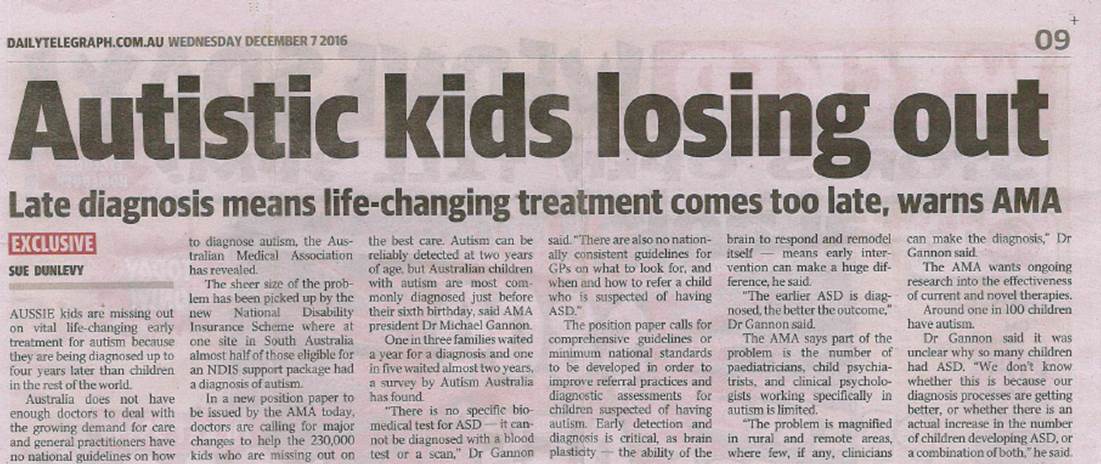
AAP
AMA position statement on Autism Spectrum Disorder recommendations:
- Effective and evidence-based treatments should be instituted as soon as possible to maximise the effectiveness of therapies
- That governments, the relevant medical colleges and professional bodies ensure that there are a suitable number of clinicians and other professionals to ensure timely access to diagnostic assessment for children suspected of having ASD
- Medical practitioners work with families and teachers who spend lengthy periods of time with a child and seek their insights and observations
- The development of comprehensive guidelines and/or national standards for referral practices and diagnostic assessments be developed
- There be ongoing research into the effectiveness of current and novel therapies
- That all health professionals who interact with children be encouraged to develop and maintain their understanding of early signs and symptoms of ASD
- The government make a strong, ongoing commitment that people who are affected by ASD will have ongoing access to support through the National Disability Insurance Scheme (NDIS).
from http://www.sbs.com.au/news/article/2016…;
AMA urges call to action on autism
GPs are often the first person anxious parents turn to when they suspect their child might have autism, yet too many are forced to wait unnecessary wait times for referrals and diagnosis.
Recognising the integral role GPs play in 'critical' early detection and the need for a national policy, the Australian Medical Association (AMA) has issued a call to action with the release of its 2016 position statement on Autism Spectrum Disorder (ASD).
The AMA wants to see co-ordinated national action to speed up the diagnosis of autism in children to ensure essential early intervention is available to families in need.
Australian Medical Association President Dr Michael Gannon says parents are currently forced to wait too long for a diagnosis - a problem magnified by a limited number of paediatricians, child psychiatrists and clinical psychologists specialising in ASD.
Dr Gannon, who will launch the position statement in Sydney on Wednesday, has also called on the federal government to rule out any future narrowing of the eligibility requirements for people with ASD to access the National Insurance Scheme (NDIS).
Current research suggests ASD can be reliably detected at two years of age, but currently in Australia the average age of diagnosis is just before a child's sixth birthday, according to analysis of Medicare data.
A recent survey by peak advocacy and support group Autism Awareness Australia found that 34 per cent of families waited more than a year for a diagnosis, and close to 20 per cent waited more than two years.
Autism is a broad term used to describe developmental disabilities characterised by difficulties in social interaction, impaired communication, restricted and repetitive interests and behaviours and sensory activities.
There is currently no reliable data on the prevalence of ASD in Australia but based on UK estimates and ABS data approximately 230,000 children in Australia could meet the diagnostic criteria.
What is known is that an increasing number of children are being diagnosed and that the earlier ASD is detected, the better the outcome.
'Early detection and diagnosis is critical, as brain plasticity - the ability of the brain to respond and remodel itself - means early intervention can make a huge difference,' said Dr Gannon, who also took aim at anti-vaccination activists for making 'wild and misleading' claims about the cause of ASD.
Autism Awareness Australia CEO Nicole Rogerson has welcomed the AMA position statement.
'We are delighted to see this important autism policy come to light,' she said.
See more at: http://www.skynews.com.au/news/national…
AMA calls for more doctors to diagnose and treat Australian kids with autism
AUSTRALIAN kids are missing out on vital life changing early treatment for autism because they are being diagnosed up to four years later than children around the world.
Australia does not have enough doctors to deal with the growing demand for care and general practitioners have no guidelines on how to diagnose autism, the Australian Medical Association has revealed.
The sheer size of the problem has been picked up by the new National Disability Insurance Scheme where at one site in South Australia, almost half of those eligible for a support package had a diagnosis of autism.
In a new position paper to be issued by the AMA on Wednesday, doctors are calling for major changes to help the 230,000 kids who are missing out on the best care.
Autism can be reliably detected at two years of age but Australian children with autism are most commonly diagnosed just before their sixth birthday, said AMA president Dr Michael Gannon.
One in three families waited a year for a diagnosis and one in five waited almost two years, a survey by Autism Australia found.
Most Aussie kids will wait until they’re six before receiving an autism diagnosis. Picture iStock
There is no specific biomedical test for ASD — it cannot be diagnosed with a blood test or a scan,” Dr Gannon said.
There are also no nationally consistent guidelines for GPs on what to look for, and when and how to refer a child who is suspected of having ASD,” he said.
The position paper calls for comprehensive guidelines or minimum national standards to be developed in order to improve referral practices and diagnostic assessments for children suspected of having autism.
Early detection and diagnosis is critical, as brain plasticity — the ability of the brain to respond and remodel itself — means early intervention can make a huge difference, he said.
“The earlier ASD is diagnosed, the better the outcome,” Dr Gannon said.
The AMA says part of the problem is the number of paediatricians, child psychiatrists, and clinical psychologists working specifically in autism is limited.
“The problem is magnified in rural and remote areas, where few, if any, clinicians can make the diagnosis,” Dr Gannon said.
The AMA’s position statement calls for a suitable number of clinicians to be employed, ensuring timely access to diagnostic assessment for children suspected of having autism. Picture: Thinkstock
The AMA Position Statement calls for evidence-based treatments to be instituted as soon as possible to maximise the effectiveness of such therapies.
It calls for governments and medical colleges to ensure that there are a suitable number of clinicians and other professionals to ensure timely access to diagnostic assessment for children who are suspected of having autism.
It wants ongoing research into the effectiveness of current and novel therapies.
Fearing the large number of autism cases presenting to the NDIS could threaten continuing access to the scheme for people with this condition and the AMA wants a guarantee on continuing support.
“While the sustainability of the NDIS is not currently under threat, demand that outweighs resourcing may eventually undermine the Scheme in the longer term,” the statement said.
“One concern is that the demand will be addressed by narrowing the eligibility for children with ASD. Given the very real benefits of access to early intervention packages (offered through the Scheme), this is not ideal,” the AMA said.
Around one in 100 children have autism and ABS data indicates 230,000 children meet the diagnostic criteria.
Autism diagnoses are soaring. Picture istock
Dr Gannon said it was unclear why there was a growth in the number of children being diagnosed with autism.
“We don’t know whether this is because our diagnosis processes are getting better, or whether there is an actual increase in the number of children developing ASD, or a combination of both,” he said.
Dr Gannon also criticised anti-vaccination activists and others who made wild and misleading claims about the cause of ASD.
The CEO of Autism Awareness Australia, Nicole Rogerson, said that, for too long, autism has been put in the “disability basket”, without proper recognition of the integral role doctors play in early detection and supporting families.
“GPs are often the first point of call for parents who are concerned about their child’s development, yet we are still seeing longer than necessary wait times for referrals and diagnosis,” Nicole said.
“We have welcomed working with the AMA over the last year, and are delighted to see this important autism policy come to light.”
Autism is a broad term used to describe developmental disabilities characterised by difficulties in social interaction, impaired communication, restricted and repetitive interests and behaviours, and sensory activities.
from http://www.heraldsun.com.au/lifestyle/h…;



